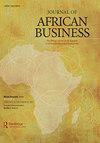Does Language Matter When Advertising to Africa’s Multilingual Audience? An ELM Study of Audience Language Preference and Responses
IF 1.8
Q3 BUSINESS
引用次数: 1
Abstract
ABSTRACT Choosing the most effective language is critical when advertising to multilingual audiences as the success of any advertising campaign depends on whether the audience “gets” the message. This paper argues that in Africa, “getting the message” is partly dependent on language given that indigenous languages, colonial legacy languages and blends between them compete for audience attention. Using Elaboration Likelihood Model (ELM) arguments, the study examines this possibility among a 1000 multilingual audience members in five cosmopolitan cities in Ghana. Findings show that advertisements are not consumed in a language vacuum and that language blends are the most appealing to the multilingual audience. The study also finds that attention to, and belief in advertisements are partly shaped by language preference. Besides these empirical contributions, the study positions the ELM as a viable theoretical lens for analyzing the implications of advertising language. Its use of an African sample to test the ELM’s assumptions also introduces novel evidence to the theory’s body of scholarship. Recommendations are made on how advertising practitioners and brand communicators may take advantage of language as an important segmentation criterion in advertising strategy.向非洲多语言受众做广告时语言重要吗?受众语言偏好与反应的ELM研究
摘要在向多语言受众做广告时,选择最有效的语言至关重要,因为任何广告活动的成功都取决于受众是否“理解”了信息。本文认为,在非洲,“获得信息”在一定程度上取决于语言,因为土著语言、殖民地遗留语言及其混合语言都在争夺观众的注意力。利用精化可能性模型(ELM)的论点,该研究在加纳五个国际大都市的1000名多语言受众中检验了这种可能性。研究结果表明,广告不是在语言真空中消费的,语言融合对多语言受众最具吸引力。研究还发现,对广告的关注和信念在一定程度上是由语言偏好决定的。除了这些实证贡献外,本研究还将ELM定位为分析广告语言含义的一个可行的理论视角。它使用非洲样本来测试ELM的假设,也为该理论的学术体系引入了新的证据。建议广告从业者和品牌传播者如何利用语言作为广告策略中的一个重要细分标准。
本文章由计算机程序翻译,如有差异,请以英文原文为准。
求助全文
约1分钟内获得全文
求助全文
来源期刊

Journal of African Business
BUSINESS-
CiteScore
4.60
自引率
10.50%
发文量
36
期刊介绍:
Journal of African Business is the official journal of the Academy of African Business and Development, the largest network of professionals committed to advancement of business development in African nations. JAB strives to comprehensively cover all business disciplines by publishing high quality analytical, conceptual, and empirical articles that demonstrate a substantial contribution to the broad domain of African business. Regardless of the research context, tradition, approach, or philosophy, manuscripts submitted to JAB must demonstrate that the topics investigated are important to the understanding of business practices and the advancement of business knowledge in or with Africa. Particularly, JAB welcomes qualitative and quantitative research papers. JAB is not, however, limited to African-based empirical studies. It searches for various contributions, including those based on countries outside Africa that address issues relevant to African business. Targeted toward academics, policymakers, consultants, and executives, JAB features the latest theoretical developments and cutting-edge research that challenge established beliefs and paradigms and offer alternative ways to cope with the endless change in the business world. Covered areas: Accounting; Agribusiness Management and Policy; Business Law; Economics and Development Policy; Entrepreneurship and Family Business; Finance; Global Business; Human Resource Management; Information and Communications Technology (ICT); Labor Relations; Marketing; Management Information Systems (MIS); Non-Profit Management; Operations and Supply Chain Management; Organizational Behavior and Theory; Organizational Development; Service Management; Small Business Management; Social Responsibility and Ethics; Strategic Management Policy; Technology and Innovation Management; Tourism and Hospitality Management; Transportation and Logistics
 求助内容:
求助内容: 应助结果提醒方式:
应助结果提醒方式:


